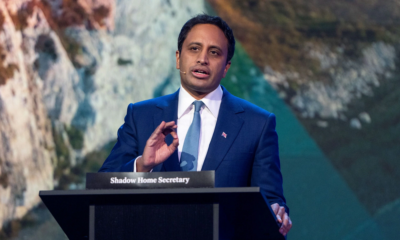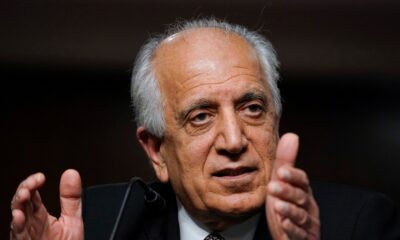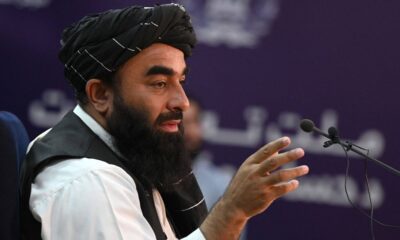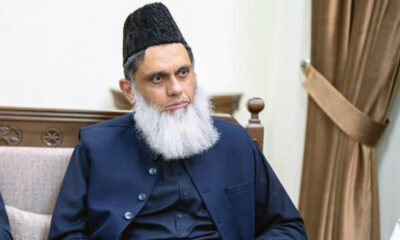World
Bill and Melinda Gates to divorce, but charitable foundation to remain intact

Billionaire benefactors Bill and Melinda Gates, co-founders of one of the world’s largest private charitable foundations, filed for divorce on Monday after 27 years of marriage but pledged to continue their philanthropic work together.
The Bill & Melinda Gates Foundation has become one of the most powerful and influential forces in global public health, spending more than $50 billion over the past two decades to bring a business approach to combating poverty and disease.
The Gates have backed widely praised programs in malaria and polio eradication, child nutrition and vaccines. The foundation last year committed some $1.75 billion to COVID-19 relief.
In a joint petition for dissolution of marriage, the couple asserted their legal union was “irretrievably broken,” but said they had reached agreement on how to divide their marital assets. No details of that accord were disclosed in the filing in King County Superior Court in Seattle.
Bill Gates, 65, who co-founded Microsoft Corp (MSFT.O), and his spouse, Melinda French Gates, 56, met after she joined the software giant as a product manager, and they dated for a few years before marrying in January 1994 in Hawaii.
“After a great deal of thought and a lot of work on our relationship, we have made the decision to end our marriage,” the two said in a joint statement posted on each of their individual Twitter accounts.
“We no longer believe we can grow together as a couple in the next phase of our lives. We ask for space and privacy for our family as we begin to navigate this new life,” they said.
The divorce petition, which states that the couple have no minor children, comes after the youngest of their three offspring recently turned 18.
Launched in 2000, the nonprofit Bill & Melinda Gates Foundation ranks as the largest private philanthropic foundation in the United States and one of the world’s biggest, with net assets of $43.3 billion at the end of 2019, according to the latest full-year financials shown on its website.
From 1994 through 2018, the couple gifted more than $36 billion to the Seattle-based foundation, the website said.
Last year, investor Warren Buffett reported donating more than $2 billion of stock from his Berkshire Hathaway Inc (BRKa.N) to the Gates Foundation as part of previously announced plans to give away his entire fortune before his death.
‘NO CHANGES TO THEIR ROLES’
In their divorce petition, the couple asks the court “to dissolve our marriage” and to divide their communal property, business interests and liabilities “as set forth in our separation contract,” though that accord was not made public.
Bill Gates is ranked No. 4 on the Forbes list of the world’s wealthiest individuals, with an estimated $124 billion fortune.
In a separate statement, the Gates Foundation said the couple would remain as co-chairs and trustees of the organization.
“They will continue to work together to shape and approve foundation strategies, advocate for the foundation’s issues, and set the organization’s overall direction,” the foundation’s statement said.
The split comes two years after another leading Seattle-based billionaire and philanthropist, Amazon.com Inc (AMZN.O) founder Jeff Bezos, said that he and his then-wife, MacKenzie, were getting divorced.
At least one critic of billionaire benefactors cited the Gates’ split as a cautionary tale in the wisdom of concentrating so much sway over global humanitarian issues under the control of super-wealthy individuals.
“The Gates divorce will do more than upend a family’s life. It will ramify into the worlds of business, education, public health, civil society, philanthropy, and beyond,” Anand Giridharadas, author of the book “Winners Take All” told Reuters.
“That is because our society has made the colossal error of allowing wealth to purchase the chance to make quasi-governmental decisions as a private citizen,” he said.
Gates dropped out of Harvard University to start Microsoft with school chum Paul Allen in 1975. Gates owned 49% of Microsoft at its initial public offering in 1986, which made him an instant multimillionaire. With Microsoft’s explosive growth, he soon became one of the world’s wealthiest individuals.
After an executive tenure in which he helped transform the company into one of the world’s leading technology firms, Gates stepped down as CEO of Microsoft in 2000 to focus on philanthropy. He remained chairman until 2014 and left the company’s board in March 2020.
Known in the technology industry as an acerbic and ruthless competitor, Gates drew the ire of rivals and eventually the U.S. government for Microsoft’s business practices.
The software giant was convicted of antitrust violations in the late 1990s. But the verdict was overturned on appeal, and the company then settled the case out of court.
Gates’ public persona softened into an avuncular elder statesman as he turned his attention to philanthropy, and he has largely steered clear of the many controversies currently roiling the technology business.
Melinda French Gates, who recently added her maiden name on most of her websites and social media, was raised in Dallas and studied computer science and economics at Duke University before joining Microsoft.
In 2015 she founded Pivotal Ventures, an investment company focused on women and families, and in 2019 published a book, “The Moment of Lift”, centered on female empowerment.
World
Iran and U.S. to meet on Thursday for talks

Iran and the U.S. will hold a third round of nuclear talks on Thursday in Geneva, Oman’s Foreign Minister Badr Albusaidi said on Sunday, amid growing concerns about the risk of military conflict between the longtime adversaries.
The U.S. has built up its military presence in the Middle East, with President Donald Trump warning on Thursday that “really bad things will happen” if no deal is reached to solve a longstanding dispute over Tehran’s nuclear programme, Reuters reported.
“Pleased to confirm U.S.-Iran negotiations are now set for Geneva this Thursday, with a positive push to go the extra mile towards finalizing the deal,” said Oman’s foreign minister, who acts as a mediator in indirect talks between Washington and Tehran.
Reuters reported on Sunday that Iran was offering fresh concessions on its nuclear programme in order to reach a deal, as long as it includes the lifting of economic sanctions and recognises Tehran’s right to “peaceful nuclear enrichment”.
Iran’s President Masoud Pezeshkian voiced cautious optimism on Sunday in a post on X saying recent negotiations had “yielded encouraging signals”, while pointing at Tehran’s readiness for “any potential scenario”.
TRUMP CURIOUS AS TO WHY TEHRAN HASN’T ‘CAPITULATED’
Trump’s special envoy Steve Witkoff, who leads nuclear negotiations on the U.S. side, said on Saturday that the U.S. President was curious as to why Iran has not yet “capitulated” and agreed to curb its nuclear programme.
“I don’t want to use the word ‘frustrated,’ because he understands he has plenty of alternatives, but he’s curious as to why they haven’t… I don’t want to use the word ‘capitulated,’ but why they haven’t capitulated,” Witkoff said during an interview with Fox News’ “My View with Lara Trump,” hosted by the president’s daughter-in-law.
“Why, under this pressure, with the amount of seapower and naval power over there, why haven’t they come to us and said, ‘We profess we don’t want a weapon, so here’s what we’re prepared to do’? And yet it’s sort of hard to get them to that place.”
Iran’s Foreign Minister Abbas Araqchi reacted in a post on X saying: “Curious to know why we do not capitulate? Because we are Iranian.”
He also said in an interview with CBS that a diplomatic solution with the U.S. was still within reach.
IRAN DENIES SEEKING NUCLEAR WEAPONS
Indirect talks last year did not bring any agreement, primarily due to friction over a U.S. demand that Iran forgo uranium enrichment on its soil, which Washington views as a pathway to a nuclear bomb. Iran has denied seeking such weapons.
The U.S. joined Israel in hitting Iranian nuclear sites in June, effectively curtailing Iran’s uranium enrichment, with Trump saying its key nuclear sites were “obliterated”. But Iran is still believed to possess stockpiles enriched previously, which Washington wants it to relinquish.
“They’ve been enriching well beyond the number that you need for civil nuclear. It’s up to 60% (fissile purity),” Witkoff said. “They’re probably a week away from having industrial, industrial-grade bomb-making material, and that’s really dangerous.”
Fresh concessions being considered by Iran include sending half of its highly enriched uranium abroad while diluting the rest.
Washington has also sought to expand the talks beyond the nuclear issue to cover Iran’s missile programme and its support for regional armed groups. Iran has publicly rejected this, although sources have told Reuters that unlike the missiles, support for armed groups may not be a red line for Tehran.
Another topic of friction is the scope and mechanism of lifting sanctions on Iran. A senior Iranian official told Reuters on Sunday that Iran and the United States still have differing views.
Witkoff also said he has met at Trump’s direction with Iranian opposition figure Reza Pahlavi, son of the shah ousted in Iran’s 1979 Islamic Revolution. He did not provide further details of the meeting.
Pahlavi, who lives in exile, served as a rallying figure for some of Iran’s opposition during anti-government demonstrations last month in which thousands of people are believed to have been killed, the worst domestic unrest since the revolution era.
Earlier in February, Pahlavi said U.S. military intervention in Iran could save lives, and urged Washington not to spend too long negotiating with Tehran’s clerical rulers on a nuclear deal.
World
Trump furious after Supreme Court upends his global tariffs, imposes new 10% levy

U.S. President Donald Trump responded with fury to Friday’s Supreme Court ruling that he lacked the power to unilaterally set tariffs on imports, denouncing individual justices as he vowed to continue a global trade war that has kept the world on edge for a year.
Saying he was undeterred by what he repeatedly called a ridiculous ruling, Trump announced an immediate new 10% tariff on imports from all countries, on top of any existing tariffs, and then issued a proclamation putting them into effect. The law allows him to impose a levy of up to 15% for 150 days, although it could face legal challenges, Reuters reported.
The court’s landmark 6-3 ruling upended the leverage Trump and his trade envoys have wielded over foreign governments at negotiating tables to reshape diplomatic relations and global markets.
The ruling briefly sent U.S. stock indexes surging, before ending modestly higher as analysts warned of renewed confusion in global markets while they await Trump’s next moves.
Hours after the ruling, Trump signed an executive order repealing the tariffs that the court struck down, and he also issued a proclamation imposing a 10% duty on most goods imported into the U.S. for 150 days, granting exemptions for certain items including critical minerals, metals and energy products, the White House said.
TRADE DEALS, REVENUE IN QUESTION
The ruling called into question the trade deals Trump’s envoys have negotiated in recent months under the threat of high tariffs. It left open the fate of the $175 billion Trump has collected from U.S. importers under what the court said was his incorrect reading of the law.
“I’m ashamed of certain members of the court, absolutely ashamed, for not having the courage to do what’s right for our country,” Trump told reporters at the White House, complaining that foreign countries were ecstatic and “dancing in the street.”
He insinuated, without evidence, that the majority of the court caved to foreign influence: “They’re very unpatriotic and disloyal to our Constitution. It’s my opinion that the court has been swayed by foreign interests and a political movement that is far smaller than people would ever think.”
Since returning to the White House 13 months ago, Trump has said he had what the court summarized as the “extraordinary power to unilaterally impose tariffs of unlimited amount, duration, and scope.” Citing a national emergency, he said the International Emergency Economic Powers Act (IEEPA) meant he could set tariffs at any rate he chose.
The court grounded its opinion, which was written by Chief Justice John Roberts, with a quote from the U.S. Constitution: “The Congress shall have Power To lay and collect Taxes, Duties, Imposts and Excises.”
The argument by the Trump administration that it had identified a war-like emergency to justify a loophole failed to persuade the court.
“The Government thus concedes, as it must, that the President enjoys no inherent authority to impose tariffs during peacetime,” Roberts wrote.
“And it does not defend the challenged tariffs as an exercise of the President’s warmaking powers. The United States, after all, is not at war with every nation in the world.”
Despite the court’s bluntness in ruling the president had exceeded his authority, Trump told reporters: “It’s ridiculous, but it’s OK, because we have other ways, numerous other ways.”
ECONOMIC UNCERTAINTY RISES
After a year of Trump’s often ad hoc tariff announcements whipsawing markets and the global economy, the ruling and Trump’s response reintroduced a hefty dose of uncertainty that economists, investors and policymakers had hoped was in the rearview mirror.
“I think it will just bring in a new period of high uncertainty in world trade, as everybody tries to figure out what the U.S. tariff policy will be going forward,” said Varg Folkman, analyst at the European Policy Centre think tank.
U.S. Treasury Secretary Scott Bessent said the court ruling could have mixed results.
“The Supreme Court has taken away the President’s leverage, but in a way, they have made the leverage that he has more draconian because they agreed he does have the right to a full embargo,” Bessent told “The Will Cain Show” on Fox News.
“We will get back to the same tariff level for the countries. It will just be in a less direct and slightly more convoluted manner,” he said.
In announcing his new temporary 10% tariff, Trump became the first president to invoke Section 122 of the Trade Act of 1974, which allows the president to levy tariffs of up to 15% for up to 150 days to fix “fundamental international payments problems.” That, too, could draw legal challenges. Such tariffs can only be extended with Congress’ authorization.
World
Trump warns Iran of ‘bad things’ if no deal made, sets deadline of 10-15 days

President Donald Trump warned Iran on Thursday it must make a deal over its nuclear program or “really bad things” will happen, and set a deadline of 10 to 15 days, drawing a threat from Tehran to retaliate against U.S. bases in the region if attacked.
Amid a massive U.S. military buildup in the Middle East that has fueled fears of a wider war, Trump said negotiations with Iran to end the tense standoff were going well but demanded that Tehran reach a “meaningful” agreement, Reuters reported.
“Otherwise bad things happen,” Trump, who has repeatedly threatened to attack Iran, told the first meeting of his Board of Peace in Washington.
Trump spoke of the U.S. airstrikes carried out in June, saying Iran’s nuclear potential had been “decimated,” adding “we may have to take it a step further or we may not.”
“You’ll be finding out over the next probably 10 days,” he said. Asked later to elaborate, he told reporters aboard Air Force One: “I would think that would be enough time, 10, 15 days, pretty much maximum.”
But he declined to be specific, except to warn again of “really bad things” and insist that Iran would have to make a deal one way or another.
In a letter to U.N. Secretary-General Antonio Guterres, Tehran said it would not start any war but that “in the event that it is subjected to military aggression, Iran will respond decisively and proportionately” in its exercise of the right of self-defense.
“All bases, facilities, and assets of the hostile force in the region would constitute legitimate targets,” the letter said. “The United States would bear full and direct responsibility for any unpredictable and uncontrolled consequences.”
‘GOOD TALKS’: TRUMP
Trump’s threats to bomb Iran, with the two sides far apart in talks on Tehran’s nuclear program, have pushed up oil prices, and a Russian corvette warship on Thursday joined planned Iranian naval drills in the Gulf of Oman, a vital sea route for global energy.
Iranian and U.S. negotiators met on Tuesday and Iranian Foreign Minister Abbas Araqchi said they had agreed on “guiding principles.” White House press secretary Karoline Leavitt said on Wednesday, however, that the two sides remained apart on some issues.
Trump said “good talks are being had,” and a senior U.S. official said Iran would make a written proposal on how to address U.S. concerns.
Trump called on Tehran to join the U.S. on the “path to peace.”
“They can’t have a nuclear weapon, it’s very simple,” he said. “You can’t have peace in the Middle East if they have a nuclear weapon.”
Iran has resisted making major concessions on its nuclear program, though insisting it is for peaceful purposes. The U.S. and Israel in the past have accused Tehran of trying to develop a nuclear bomb.
Trump’s latest saber-rattling came as he talked himself up as a man of peace in a long, meandering speech while hosting world leaders at the launch of his Board of Peace. He proposed the body in September when he announced his plan to end Israel’s war against Hamas in Gaza. He later expanded the board’s remit to tackle conflicts worldwide, prompting many key Western allies to stay away.
Earlier on Thursday, Russia warned against an “unprecedented escalation of tension” around Iran on Thursday and urged restraint amid the U.S. military buildup in the region, which a senior American official said should be complete by mid-March.
THREAT OF WAR
Trump has sent aircraft carriers, warships and jets to the region, raising the prospect of another attack on the Islamic Republic.
The United States and Israel bombed Iran’s nuclear facilities and some military sites last June. U.S. Secretary of State Marco Rubio will meet Israeli Prime Minister Benjamin Netanyahu to discuss Iran on February 28, the senior U.S. official said.
Washington wants Iran to entirely give up uranium enrichment, a process used to create fuel for atomic power plants but that can also provide material for a warhead.
The U.S. and ally Israel also want Iran to give up long-range ballistic missiles, stop supporting groups around the Middle East and stop using force to quell internal protests.
Iran says it refuses to discuss issues beyond the atomic file, calling efforts to limit its missile arsenal a red line.
Satellite pictures have tracked both Iranian work to repair and fortify sites since last summer, showing work at both nuclear and missile sites, as well as preparations at U.S. bases across the Middle East over the past month.
Iran’s joint exercise with Russia came days into an extended series of Iranian naval drills in the Gulf of Oman, with Iranian state television showing special forces units deployed on helicopters and ships.
In a sign of growing concern over the increased tensions, Poland on Thursday became the latest European country to urge its citizens to leave Iran, with Prime Minister Donald Tusk saying Poles may only have hours to evacuate.
Trump began threatening strikes on Iran again in January as Iranian authorities crushed widespread protests with deadly violence that left thousands dead across the country.
-
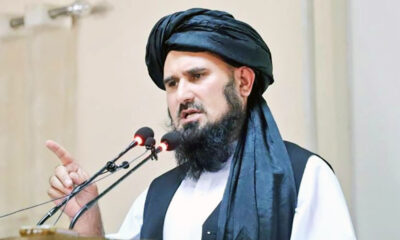
 Latest News5 days ago
Latest News5 days agoAfghanistan’s Chief of Armed Forces underscores readiness and equipment for national defense
-

 Latest News4 days ago
Latest News4 days agoAfghanistan welcomes investment and technology partnerships with India
-

 Sport4 days ago
Sport4 days agoAfghan Peaks founder climbs Aconcagua to promote Afghanistan’s mountain potential
-

 Latest News3 days ago
Latest News3 days agoIndian customs seize Chinese walnuts falsely declared as Afghan
-

 Business4 days ago
Business4 days agoPakistan allows re-export of stranded Afghan transit cargo
-
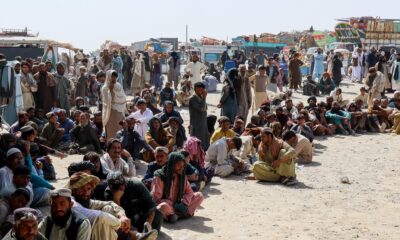
 Latest News3 days ago
Latest News3 days agoPakistan’s Punjab to send home 20 more Afghans in repatriation drive
-

 Latest News4 days ago
Latest News4 days agoPakistan signals possible air strikes as Kabul releases Pakistani soldiers in goodwill move
-
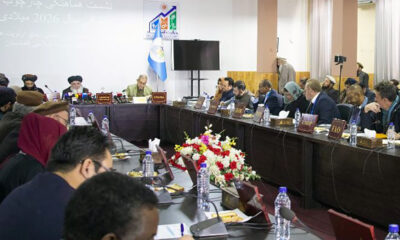
 Business5 days ago
Business5 days agoAfghanistan’s 2026 Development Framework meeting highlights self-reliance and economic stability


